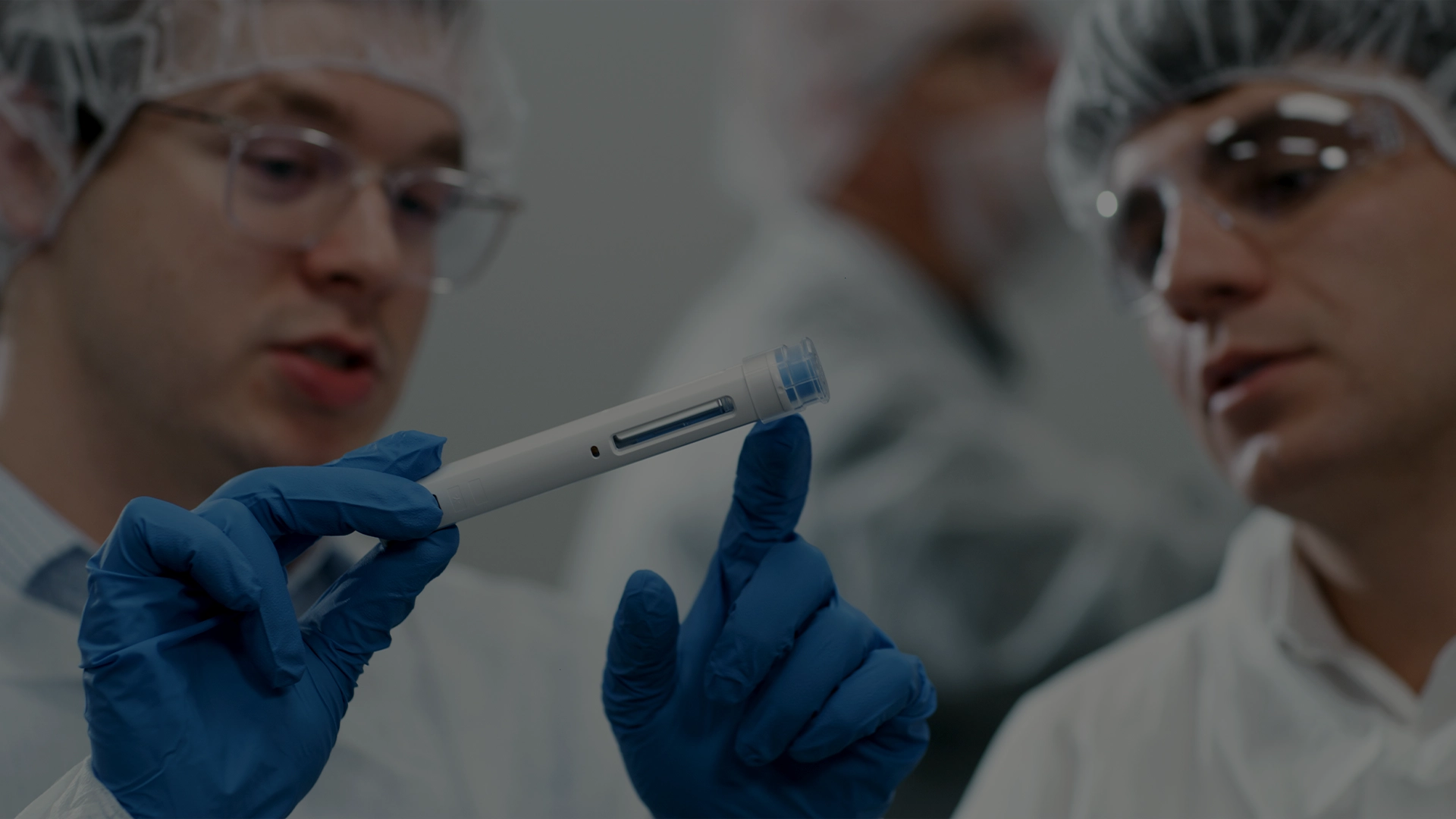The biopharmaceutical industry is continually seeking innovative solutions that can improve drug delivery, strengthen patient compliance, and optimise therapeutic outcomes.
Among the most significant advancements in this regard are autoinjectors, which have emerged as pivotal technologies in the evolving landscape of injectable therapies. Their earlier adoption into clinical trials highlights their potential to transform drug delivery systems, yet their successful integration is not without challenges. To realise the full promise of these devices, sponsors must adopt a strategic approach that addresses issues of design, drug compatibility, regulatory requirements, patient usability, and long-term scalability.

From Vials to Patient-Centric Devices
Traditionally, clinical trials particularly in early-phase studies relied on vials as the primary container for intravenous administration. These formats offered flexibility in fill volumes and dosages, aligning with the early objectives of establishing proof of concept, demonstrating safety, and determining tolerated doses. However, the industry’s increasing emphasis on patient-centricity has reshaped these conventions. With more therapies aimed at chronic conditions and rare diseases, self-administration has become an expectation rather than an exception.
Prefilled syringes, needle safety devices, and autoinjectors have therefore become integral to product portfolios. For patients, they promise ease of use, reduced injection anxiety, and greater independence. For sponsors, they deliver advantages in compliance, trial retention, and data quality. The market for autoinjectors is also being propelled by device innovation, as manufacturers improve ergonomics, expand compatibility with high-viscosity biologics, and explore connectivity features that can capture adherence data. Importantly, introducing autoinjectors during the clinical trial phase rather than waiting until commercialisation provides sponsors with valuable insights into real-world use scenarios while also accelerating the path to market readiness.
Why Autoinjectors Strengthen Clinical Trials
One of the most important advantages of autoinjectors in clinical development is their impact on patient compliance and retention. Trials that require frequent injections often struggle with dropout rates, especially if participation demands regular clinic visits. Autoinjectors empower patients to administer doses at home with minimal supervision, reducing dependence on healthcare providers and easing logistical burdens. This convenience translates directly into stronger adherence to study protocols, particularly in long-term trials.
Equally significant is the standardisation of drug delivery. Unlike manual syringe administration, which can vary by technique and user skill, autoinjectors deliver precise, reproducible doses every time. This consistency ensures the reliability of pharmacokinetic and pharmacodynamic data, which is vital when determining therapeutic profiles. The improved patient experience of minimised pain, intuitive operation, and reduced anxiety further supports retention, while optional connectivity features provide an added layer of data integrity by confirming adherence.
In essence, autoinjectors bring the trial environment closer to the real-world conditions in which patients will eventually use the therapy. This not only enhances the robustness of clinical data but also supports smoother regulatory submissions and market preparation.
Designing for Safety, Usability and Sustainability
Despite their clear advantages, incorporating autoinjectors into clinical trials requires careful planning. At the heart of this lies device design and usability. Clinical trial participants represent a diverse population, with varying levels of dexterity and familiarity with medical devices. Ensuring ease of use is therefore essential. Ergonomic designs that can be operated comfortably by patients with limited mobility, intuitive operation with as few steps as possible, and built-in reassurance features such as audible clicks or visual indicators all contribute to safe and consistent usage.
Safety mechanisms are equally critical. Needle shielding, retraction systems, and lock mechanisms reduce the risk of accidental activation or needle-stick injury, safeguarding both patients and caregivers. Beyond function, sustainability considerations are becoming more prominent. As companies seek to align with environmental targets, incorporating eco-friendly materials and packaging into autoinjector design can generate long-term benefits without compromising patient safety or product integrity.
Matching Devices with Complex Drug Products
The performance of an autoinjector is determined not only by its mechanical design but by its compatibility with the physicochemical properties of the drug product. Many modern biologics are formulated at high concentrations to enable subcutaneous delivery, which results in increased viscosity. These formulations require autoinjectors capable of delivering sufficient spring or drive force to overcome resistance through the needle while maintaining reliable injection profiles. Device robustness must be demonstrated under worst-case conditions, including temperature excursions that may further affect viscosity.
Equally critical is the evaluation of primary container and drug–device interactions. Stability testing should assess the potential for leachables and extractables from device components, lubricant migration, or silicone interactions that may impact protein stability. Alignment of device materials with the formulation is therefore central to preserving shelf life and therapeutic activity.
Device selection is also influenced by volume and dosing requirements. Larger dose volumes may exceed the capacity of certain autoinjectors, while faster injection speeds though technically feasible, can negatively impact patient comfort and adherence. For biologics in particular, precise dosing is critical, as even minor variations can affect therapeutic efficacy and safety. Finally, aligning the shelf life of both drug and device is an important consideration; discrepancies between the two can introduce usability challenges and inefficiencies across the supply chain.
Putting Patients at the Centre of Development
For autoinjectors to succeed in clinical trials, sponsors must adopt a patient-centric mindset. This begins with recognising demographic diversity: older patients, children, and those with limited dexterity may all face unique challenges in device use. Cultural attitudes toward self-injection also vary across geographies, influencing both acceptance and compliance.
Addressing psychological barriers is equally important. Many participants have a natural fear of needles, which can deter engagement. Features such as hidden needles, automatic insertion or automatic retraction can alleviate these anxieties. Training and education play a decisive role: comprehensive materials, including hands-on demonstrations, training devices, and instructional videos, ensure that patients are confident and capable of using the device. Collecting structured feedback during the trial not only supports patient satisfaction but also informs iterative improvements for future device generations and market launch.
Meeting Regulatory Demands for Combination Products
Introducing autoinjectors into clinical trials adds a layer of regulatory complexity. In most jurisdictions, these products are classified as combination products, requiring integrated submissions for both the drug and device components. The classification of the device itself based on its principal mode of action determines the depth and scope of regulatory evaluation.
Human factors studies are a core expectation from regulators. These studies demonstrate that the autoinjector can be used safely and effectively by the intended population under real-world conditions. Conducting such evaluations early in development can smooth the approval process and reduce delays. Material safety must also be assured, with biocompatibility testing confirming that device components will not interact negatively with the drug formulation.
Manufacturing Strategies: Scaling for Success
The successful integration of autoinjectors into clinical trials is not only a scientific and regulatory challenge but can also be a manufacturing one. Ensuring a robust, scalable, and cost-effective supply chain is essential. Sponsors must establish reliable sourcing partnerships, often through contract development and manufacturing organisations (CDMOs), while putting in place contingency plans to mitigate potential disruptions.
Cost-effectiveness is a recurring concern. Custom-designed autoinjectors can provide differentiation, intellectual property protection, and alignment with specific drug characteristics, but they often require significant upfront investment and face more complex regulatory pathways. Conversely, leveraging established platform devices offers lower upfront costs, smoother regulatory paths, and robust reliability, but with less opportunity for differentiation. A well-considered strategy that balances customisation against standardisation is therefore essential.
Global and Cultural Variability in Device Adoption
Autoinjector adoption is not uniform worldwide. Regional preferences and healthcare infrastructure play an important role in determining acceptance. In parts of Eastern Europe, for instance, traditional vials and syringes remain preferred, while Western Europe and North America increasingly favour prefilled syringes and autoinjectors. In markets with limited healthcare access, the robustness of the device may matter more than advanced features. As such, it has become more common to take advantage of the flexibility of the PFS to launch with region-specific use of the PFS with accessories, with NSD or assembled into an autoinjector, depending on those regional preferences. Sponsors conducting multinational trials must be sensitive to these differences, ensuring that device design, labelling, and language meet local expectations.
Balancing Cost Pressures with Long-Term Value
The inclusion of autoinjectors in clinical trials carries financial implications that extend beyond device manufacturing. Training and patient support programs add to upfront costs, while long-term investments in tooling and validation require careful planning. Yet the long-term value proposition is compelling. Improved adherence, fewer missed doses, and reduced reliance on healthcare professionals can yield significant cost savings over the lifecycle of a product. Evaluating these trade-offs early allows sponsors to build business cases that justify the initial expenditure.
Preparing for Commercial Transition
Ultimately, the integration of autoinjectors in clinical trials must prepare the way for post-market approval usage. Trial data should be leveraged to refine device design, validate usability, and build comprehensive regulatory dossiers. Preparing patient education and training materials ahead of commercial launch further supports adoption. The smoother the transition from trial to market, the greater the competitive advantage for sponsors.
Conclusion: Autoinjectors as a Defining Technology for Biopharma
Autoinjectors represent a transformative shift in drug delivery, offering clear benefits in patient compliance, dose standardisation, and user experience. Their incorporation into clinical trials enables sponsors not only to generate high-quality, real-world data but also to accelerate readiness for commercialisation. The path, however, is complex: regulatory hurdles, manufacturing strategies, patient variability, and cost pressures all require thoughtful navigation.
By addressing these challenges proactively, clinical trial sponsors can fully harness the potential of autoinjectors. In doing so, they not only enhance the likelihood of trial success but also contribute to a future where patient-centric drug delivery systems are the norm. As biopharmaceutical innovation continues to advance, autoinjectors are poised to play a defining role in shaping the next generation of therapies and improving the overall patient experience.
We are committed to supporting clients at every stage of the manufacturing cycle, delivering best-in-class services efficiently and effectively.
Find out more about our fully integrated Packaging Services.





